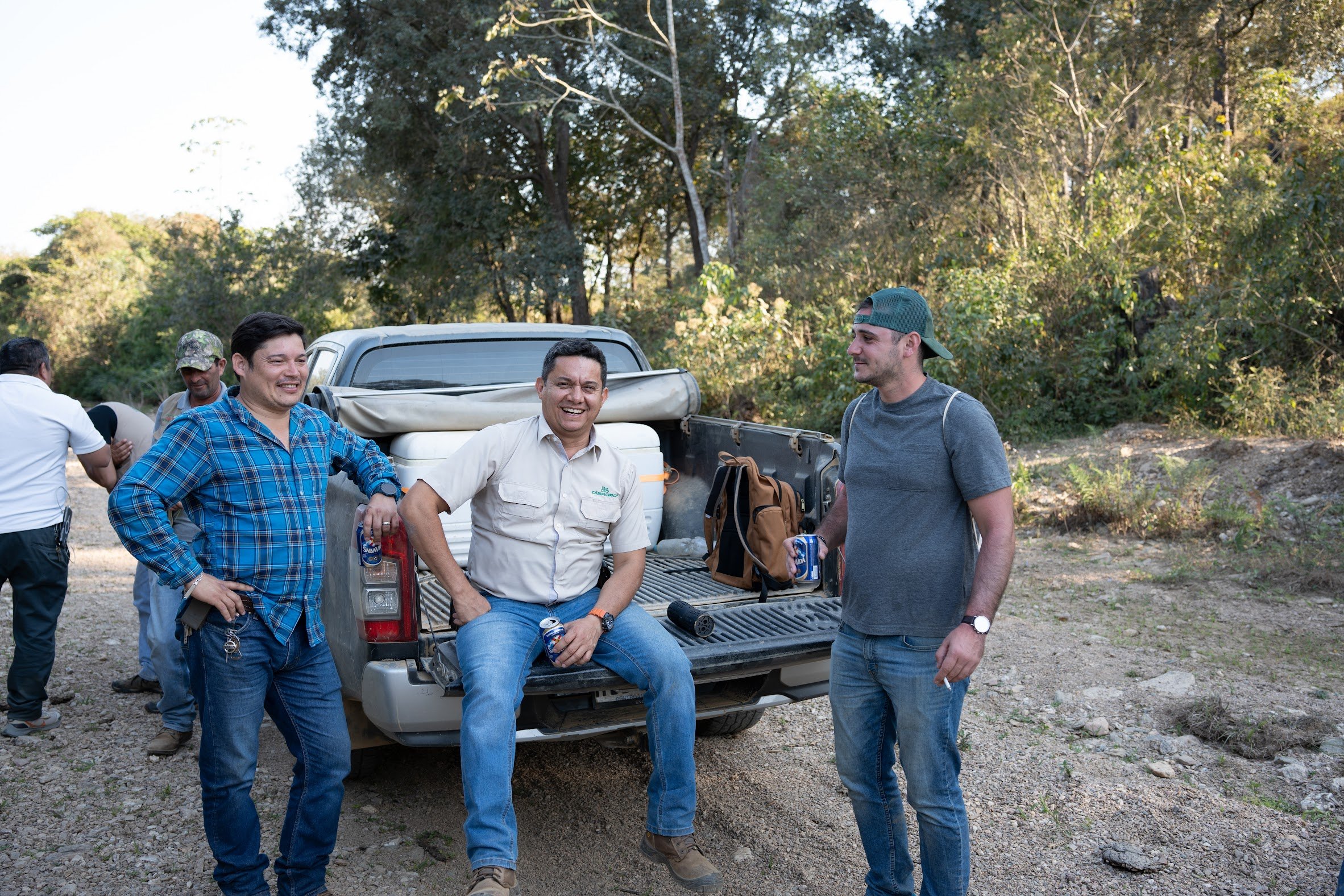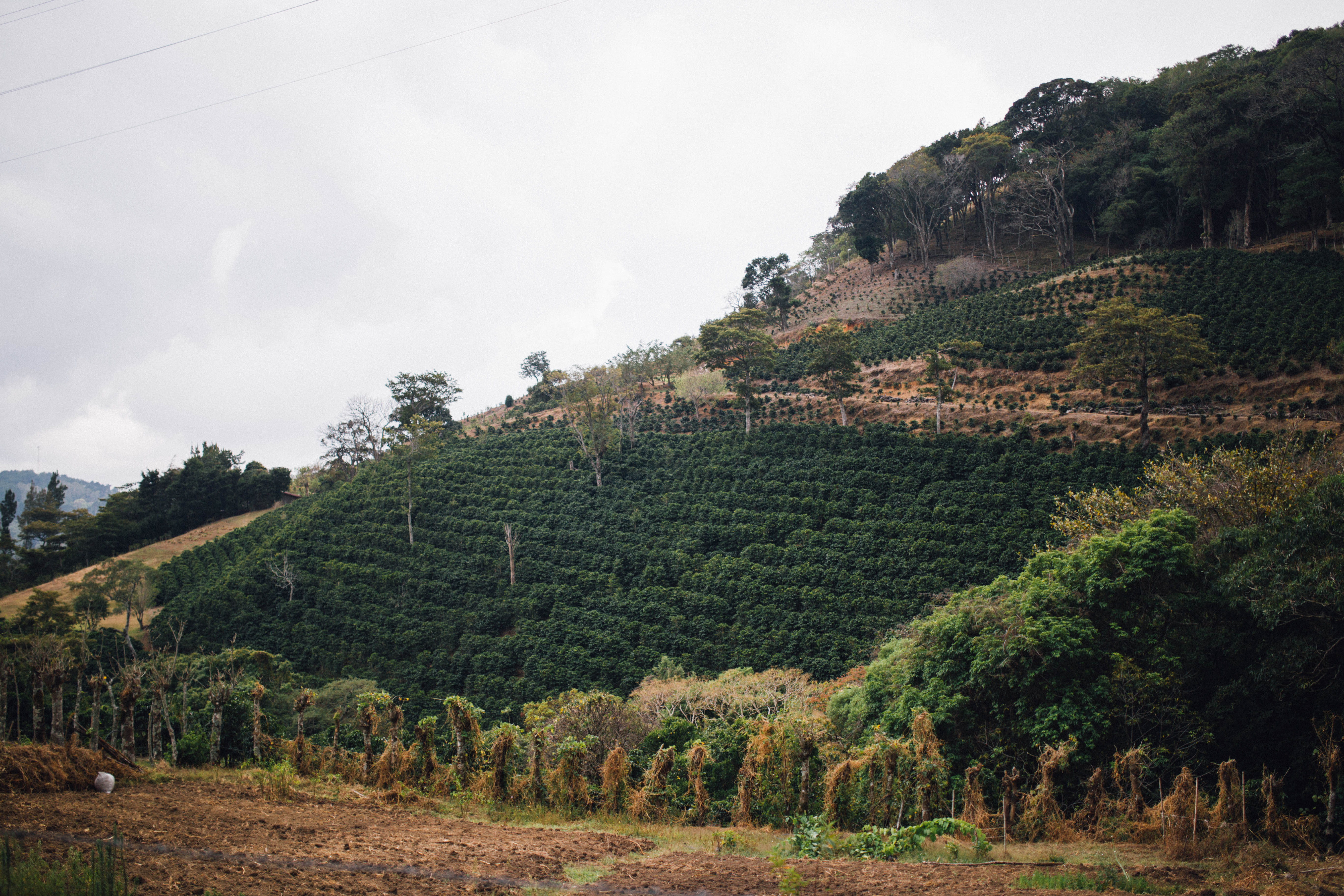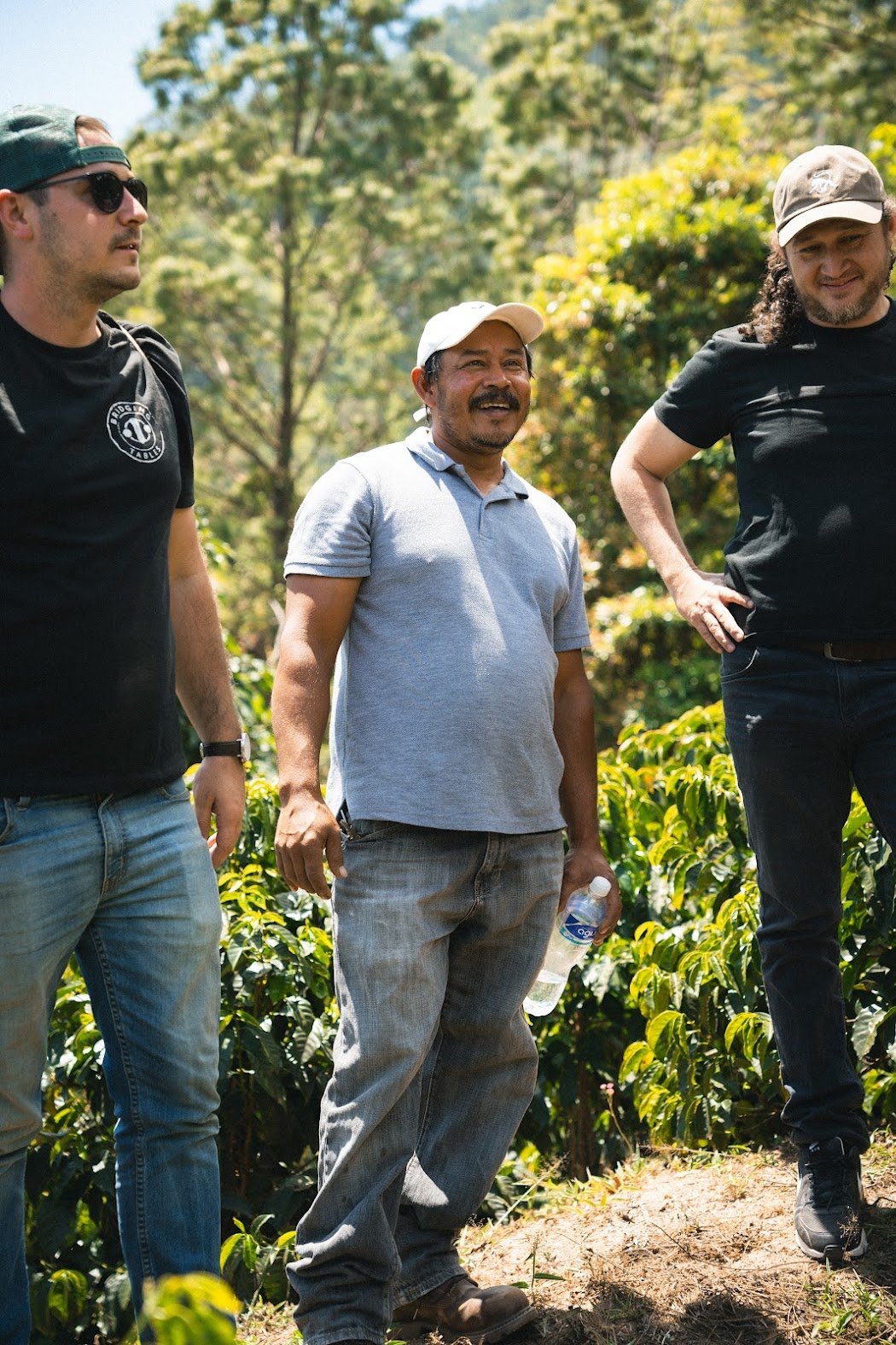At the Table
Small Roaster, Big Dreams
How Size Doesn't Determine Your Direct Sourcing Success
For small roasters watching from the sidelines, the prospect of direct sourcing can seem daunting. The traditional barriers of substantial upfront capital, complex logistics, language obstacles, and time constraints, have all historically favored larger operations with deeper pockets and dedicated sourcing teams. However, the emergence of technology-enabled supply chain solutions and innovative financing structures is democratizing access to these premium sourcing relationships.
The Market Reality: Why Producer Direct Sourcing Matters More Than Ever
Consumer behavior research consistently shows that specialty coffee buyers are increasingly sensitive to the inequities inherent in commodity coffee trading. They seek products that celebrate rather than exploit the labor that brings quality coffee to market. This shift represents more than a trend, it's a fundamental realignment of consumer values that smart roasters must address.
"When customers come into the cafe and get excited to see the new releases, that makes my barista's day a little brighter," explains Joel Smith, head of green buying at Feast Coffee & Culture who has built a thriving direct trade program. This emotional connection between consumer, barista, roaster, and ultimately producer creates a value chain that extends far beyond the transactional.
The data supports this anecdotal evidence. Roasters who invest in direct or relationship sourcing consistently report advantages in customer retention, premium pricing ability, and brand differentiation. The narrative component of direct trade coffee, or the story of the producer, the specific terroir, and processing innovations provides marketing material that resonates authentically with consumers that are increasingly skeptical of generic corporate messaging.
Breaking Down Barriers: Technology as the Great Equalizer
The widespread adoption of communication technology across emerging economies has created unprecedented opportunities for small roasters to build authentic relationships without prohibitive travel costs. WhatsApp, in particular, has emerged as a primary communication channel for requesting meetings, sharing samples, and maintaining ongoing relationships with producers.
The language barrier, while real, shouldn't become a permanent obstacle. Successful small roasters report that embracing imperfect communication, having awkward conversations with broken language on both sides, laughing about misunderstandings, and sharing personal stories through photos and videos, often strengthens rather than weakens relationships. These human moments of vulnerability and humor create bonds that transcend perfect grammar.
Video exchanges have proven particularly powerful. Roasters send footage of their roasting process, cupping sessions, and customers enjoying the final product. Producers respond with videos of harvest activities, processing innovations, and family life. This visual dialogue creates mutual understanding and investment that purely transactional relationships cannot replicate.

Access to appropriate financing represents perhaps the biggest hurdle for small roasters pursuing direct relationships. Traditional banking structures, designed for established commercial relationships, often fail to serve the unique needs of specialty coffee direct trade.
The emergence of asset-backed financing specifically designed for specialty coffee has begun to address this gap. These structures tie lending to the physical coffee itself rather than abstract credit scores, making capital more accessible to smaller operations. Pre-harvest financing, in particular, allows roasters to commit to producers early in the cycle when relationships and pricing are most favorable.
Smart financial planning for direct trade requires understanding the extended timeline between contract and delivery. Unlike spot purchasing, where coffee can be available within weeks, direct relationships often require planning six months in advance. This timeline demands sophisticated inventory management and demand forecasting skills that successful small roasters develop through experience and appropriate tooling.
The investment in direct relationships should be viewed as premium positioning that justifies corresponding pricing. Roasters who effectively communicate the story and value of their direct trade coffees consistently achieve higher margins than those relying solely on spot market purchases.
Strategic Approach: Planning for Success, Not Just Adventure
Origin travel, while valuable for relationship building, must be approached strategically rather than romantically. Successful small roasters emphasize the importance of arriving with a clear plan: specific volume requirements, defined price windows, and realistic timelines. This preparation respects both the roaster's financial constraints and the producer's time investment.
The goal extends beyond having an enjoyable cultural experience with farmers, though relationship building remains crucial. Producers typically absorb significant costs when hosting roaster visits in lost productivity, hospitality expenses, and opportunity costs. Sensitivity to these realities demonstrates respect and builds trust.
Before committing to origin travel, establish strong communication channels and mutual interest through remote relationship building. Many successful partnerships begin with extensive WhatsApp exchanges, sample evaluations, and video calls before any in-person meetings occur.
In short: know what you need before you go and expect to make some buying decisions on the spot.

Risk Management: Navigating the Challenges
Direct trade relationships, particularly with small family-run farms, introduce unique risk factors that spot market purchasing avoids. Weather patterns, government regulations, community disruptions, and agricultural challenges can significantly impact both quality and quantity of available coffee.
"If there are factors out of both of our hands, then their volume could be half of what was expected, and now we are left short on our positions," explains Joel. This volatility requires backup sourcing strategies and flexible inventory management.
Conversely, successful harvests can create the opposite problem. Producers may dramatically increase available volume year-over-year, expecting their roaster partners to scale their purchases accordingly. When small roasters cannot absorb increased volume, producers may seek buyers interested in larger quantities, potentially disrupting established relationships.
Successful risk management involves honest communication about capacity constraints, diversified sourcing across multiple producers, and clear contractual agreements about volume expectations and flexibility.
Quality vs. Relationship: Finding the Balance
While quality scores provide important objective measures, successful direct trade relationships require a more holistic evaluation framework. Many producers actively seek to improve quality year-over-year but need supportive partners willing to invest in their development journey.
Factors beyond cupping scores like farming practices, sustainability measures, processing innovation, altitude advantages, and improvement trajectories often prove more predictive of long-term relationship success. Producers motivated to take quality risks need partners who provide constructive feedback and patient support rather than purely transactional evaluations.
This approach requires roasters to think beyond immediate quality metrics toward relationship potential and mutual growth opportunities. The best direct trade partnerships involve roasters and producers learning together, experimenting with processing methods, and celebrating incremental improvements.
Building Sustainable Relationships
The most successful direct trade relationships transcend simple buyer-seller dynamics to become genuine partnerships characterized by mutual investment and shared success. This requires treating producers as equal partners rather than raw material suppliers.
Regular communication throughout the year—not just during harvest season—helps maintain these relationships. Sharing customer feedback, sales success stories, and business challenges creates reciprocal transparency that strengthens bonds. Producers appreciate knowing how their coffee performs in the market and understanding the roaster's business realities.
Payment terms and financing arrangements should reflect partnership rather than exploitation. Fair pricing that recognizes quality investments and timely payments that support producer cash flow demonstrate commitment to mutual success.
Technology and Tools: Streamlining Operations
Modern direct trade requires appropriate technological infrastructure to manage the increased complexity compared to spot purchasing. Inventory management systems, sample tracking tools, and communication platforms become essential for maintaining multiple producer relationships efficiently.
Financial planning tools help small roasters model the cash flow implications of longer lead times and larger upfront commitments. Demand forecasting becomes crucial when committing to specific volumes months in advance.
Quality feedback systems ensure producers receive actionable information about their coffee's performance, closing the loop that makes relationship-based sourcing mutually beneficial rather than simply transactional.
The Growth Trajectory
As small roasters scale their operations, direct trade relationships can evolve from individual bag purchases to more meaningful community impact. Moving enough volume to commit to half-containers or full containers transforms the economic equation for producers while creating more compelling narratives for consumers.
"We are excited that we are now moving enough volume to make an impact on a community," Joel notes, “While we can’t commit to buying 1/2 or a full container from every area we buy from, we are now able to make those types of commitments to the producers we work with leading to greater meaning in our work, more excited relationships, more excited baristas, and more excited ‘legacy’ customers”. This progression from individual relationships to community partnerships represents the ultimate expression of values-driven sourcing.
The evolution requires maintaining the personal connections that initiated these relationships while developing systems and processes that support larger volumes and multiple partnerships simultaneously.
If you are simply not big enough to build a container or contribute to one in a meaningful way, you can work with like minded roasters you don’t deem as direct competition to form a buying group. What is likely impossible for one small coffee roaster may be possible for ten that share similar mission and values.
Looking Forward: The Future of Small Roaster Direct Trade
The continued development of specialty coffee infrastructure with improved financing options, better communication tools, and more efficient logistics will further democratize direct trade access for small roasters. What remains constant is the fundamental requirement for authentic relationship building, mutual respect, and genuine commitment to shared success.
For small roasters ready to embrace direct trade, the opportunity has never been more accessible. The key lies in approaching these relationships with appropriate preparation, realistic expectations, and genuine commitment to partnership rather than purely transactional sourcing.
The coffee industry's future belongs to those who understand that relationships move markets—and that building for both creates sustainable competitive advantages that transcend simple price competition. For small roasters willing to invest in these relationships, size truly doesn't determine direct sourcing success.
This comprehensive approach to direct trade sourcing reflects the evolving landscape of specialty coffee, where technology, innovative financing, and genuine relationship building combine to create opportunities previously reserved for large-scale operations. Success requires strategy, preparation, and authentic commitment to partnership—but the rewards extend far beyond individual transactions to create lasting value for producers, roasters, and consumers alike.
Understanding Single Origin Coffee
The True Meaning of Ethical Coffee Sourcing
"Bridging Tables is doing outstanding work in the specialty coffee space—directly connecting roasters with exceptional green coffee producers. When we decided to bring in one of their offerings, they facilitated a direct introduction to the producer family, and now we have standing invitations to visit one another. It’s clear the farmers are being paid fairly, and in such a volatile market, the level of price transparency is a real relief."




